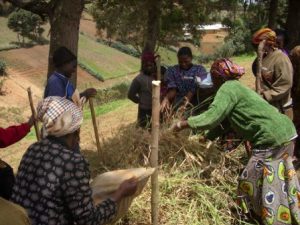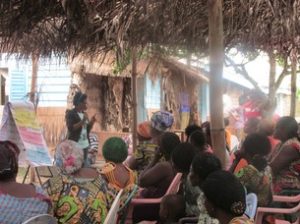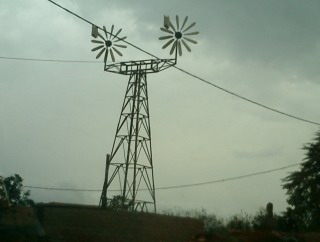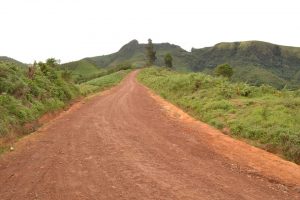Community Development
INTRODUCTION
Most often, people rely on the central government or the federal government for needs like social amenities (schools, hospitals, etc.) and some public services like water, electricity, etc. It is not wrong to do so because it is the responsibility of every central or federal government, owing to the fact that citizens pay their taxes in exchange for such benefits. However, the truth is that most central and federal governments in the world do not have enough resources (financial, human and materials) to provide such benefits to all the communities in their territories. This brings a serious challenge for certain communities within these governments to fall short of such benefits and often feel abandoned by their central or federal governments. Based on this, the fundamental question remains “how can we address this problem, keep relying on the central or federal government or take initiative to solve them by ourselves? “. Rationally, it is clear that communities have to take the responsibility or actions of providing certain needs which are their common challenges. This brings us to the concept of “Community Development” which has self-reliance as the core principle.

MUNED being an education and development network is also concern about community development because it seeks to address community challenges hence contribute to both community growth and national growth. MUNED is an advocate of community development not simply because it contribute to the community and national growth but equally because it is a democratic process through which all members of the society participate in the development process of their community and nation.
UNDERSTANDING THE CONCEPT COMMUNITY DEVELOPMENT AND THE ACTORS
It is quite challenging that most often people around the world talk of community development everyday yet still fail to understand what it is all about and who are the actors. In this regard, MUNED defines:
“Community development as a process where community members come together to take collective action and generate solutions to their common problems. Community wellbeing (economic, social, environmental and cultural) often evolves from this type of collective action being taken at a grassroots level. Community development ranges from small initiatives within a small group to large initiatives that involve the broader community”
A more superior definition is that of CAMEROON NATIONAL PLAN FOR COMMUNITY DEVELOPMENT of September 1981 which sees community development as:
“The processes by which the efforts of the people themselves are united with those of Government authorities to improve the economic, social and cultural conditions of communities, to integrate these communities into the life of the nation and to enable them to contribute fully to national progress.”
The above definition was borrowed by Cameroon National Plan for Community Development from the Economic and Social Council of the United Nations (ECOSOC).
Going by the above definition, one would realize that the actors of community development are both community members themselves and the government authorities (mostly the local government officials).

The ultimate goal of community development is to improve the economic, social and cultural conditions of communities as well as to integrate these communities into the life of the nation and give them the opportunity to also participate to the nation’s progress.
BRIEF LITERATURE REVIEW OF THE ORIGIN AND GROWTH OF COMMUNITY DEVELOPMENT
It is important to note that the concept and practices of community development were very powerful in the 1960s when most African countries achieved their independence but this concept and practice has depreciated so much because most people in the communities now believe that development is solely the responsibility of the Central Governments or the Federal Governments. According to T.R. Batten in his book titled: COMMUNITIES AND THEIR DEVELOPMENT in 1957, he wrote:
“Before the Second World War, the main emphasis in development of tropical countries was on communication and material resources. There was much less emphasis on small- scale development specifically related to the needs and welfare of the people in their local communities. Today the government of most tropical countries are aware of the need to foster development in the local community as well as at the national level: and many government now have special programmes to stimulate and help people to improve their own local way of life. These are known as community development programmes. Community development has grown beyond the limits of governments of the countries in the tropical areas. They have become a main concern of several intergovernmental agencies such as UNESCO and the Technical Assistance Committee of the United Nations……….. “

Despite the general acceptance of community development both at national level and at the UN level, most community members still believe that it is the responsibility of the government alone to provide communities with basic necessity like water, light, education, etc. Most of our elite in 60s were trained in community schools. It is good to emphasize here that no government in the world including USA, UK, Canada, Germany has ever met the needs of their communities 100%. So even in these developed countries, we still have community projects like schools, health centers, credit unions, etc.
COMMUNITY DEVELOPMENT IN AFRICA, THE CASE OF M’MUOCK (M’muockngie, M’muockmbie, M’muock Leteh and M’muock Leleng)
With deeper understanding of what community development is about, MUNED will say that over decades, African people had been able to embrace and practice the concept of community development though a lot is yet to be done. Using M’muock community as a case study, MUNED noted that the people of this community practice community development though not in greater proportion. As far back as 1980s the people of this community were able to establish community development associations like M’muock Fosimondi Development and Cultural Association (MUDECA), M’muock Fosimombin Cultural and Development Association (MOCUDA) and M’muock Leteh Cultural and Development Association (MULCUDA). Not long ago, we saw the Creation of M’muock Credit Union (M’MUOCKCCUL). Even before the creation of M’muock Credit Union, M’muock people in different towns, countries as well as in the village constituted themselves into traditional meeting commonly known as “Njangi house” where people could get micro loans to solve their basic challenges. These are strong indicators that M’muock people embraces the concept and practices of community development. Our findings reveal that MUDECA, MOCUDA and MULCUDA have financed some community development projects including construction of classrooms in schools, some rooms in the hospitals, building of bridges, creation of motorable road networks, etc.

MUNED being a research and publication network is contributing it own share to the development of M’muock tribe through research and publication activities. It is for this reason that MUNED is here to encourage community development in the M’muock tribe and also to encourage NON-STATE community development actors like MUDECA, MOCUDA, MULCUDA, M’MUOCKCCUL, NJANGI GROUPS, CSOs, CBOs and FBOs as well as STATE community development actors like the councilors, parliamentarians and senators to mutualize their efforts in tackling community development challenges within the M’muock tribe.
CONCLUSION
To conclude, MUNED will like to say that effective community development should be: a long-term endeavour, well-planned, inclusive and equitable, holistic and integrated into the bigger picture, initiated and supported by community members, of benefit to the community and grounded in experience that leads to best practices.
Also, community development is a grassroots process by which communities: become more responsible, organize and plan together, develop healthy lifestyle options, empower themselves, reduce poverty and suffering, create employment and economic opportunities and, achieve social, economic, cultural and environmental goals.
Furthermore, Community development seeks to improve quality of life. Effective community development results in mutual benefit and shared responsibility among community members. Such development recognizes: the connection between social, cultural, environmental and economic matters, the diversity of interests within a community and, its relationship to building capacity.
Community development helps to build community capacity in order to address issues and take advantage of opportunities, find common ground and balance competing interests. It doesn’t just happen – capacity building requires both a conscious and a conscientious effort to do something (or many things) to improve the community.
Thus, admitting the truth that community development has been accepted both nationally and internationally, MUNED encourages all African communities to improve their well-being by conceiving, designing and implementing community development programmes aimed at improving the social, economic and the cultural wellbeing of the African people.
